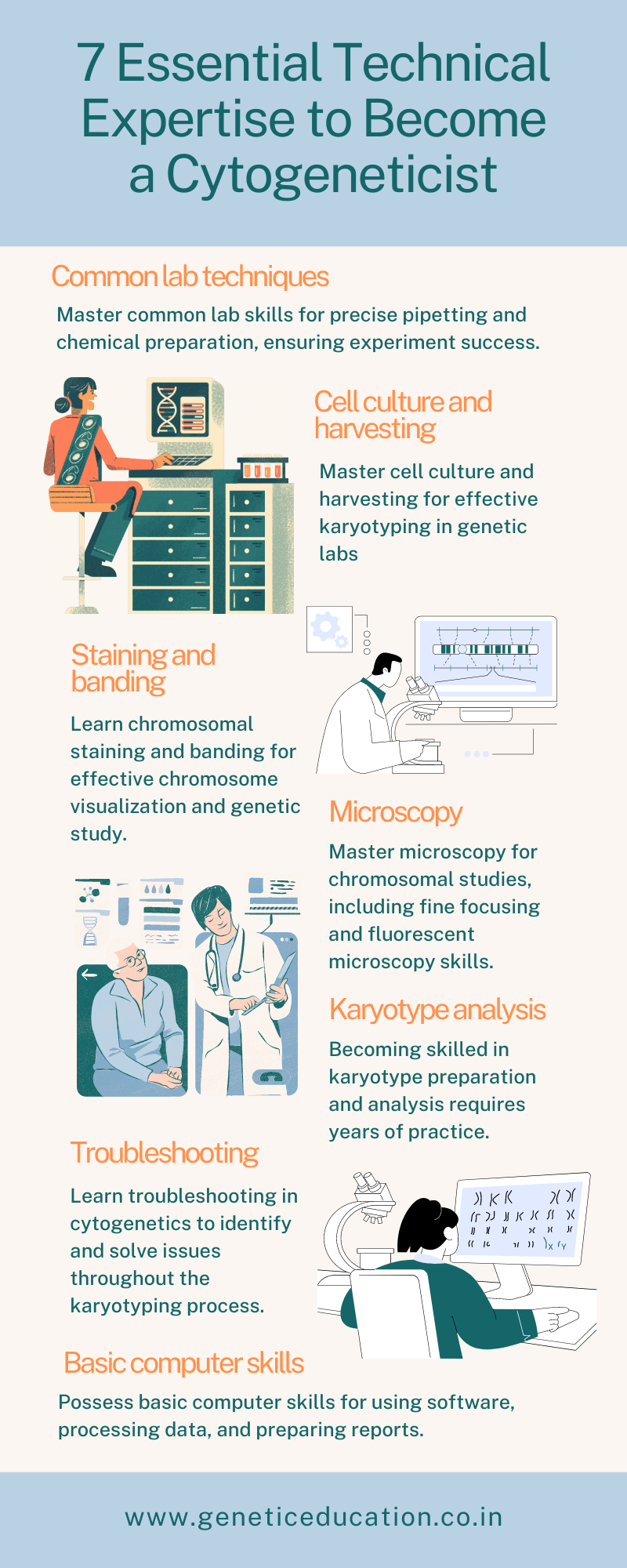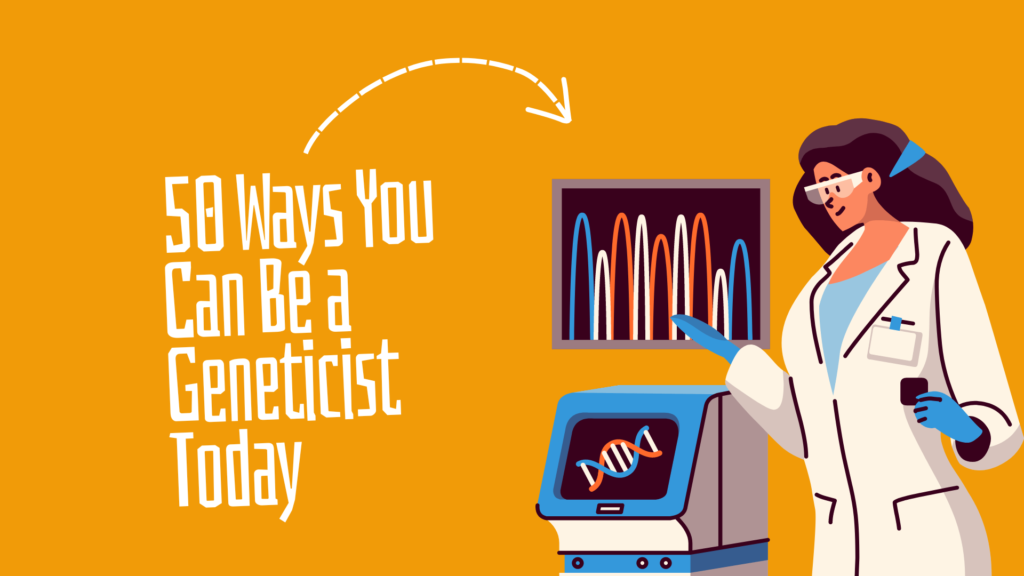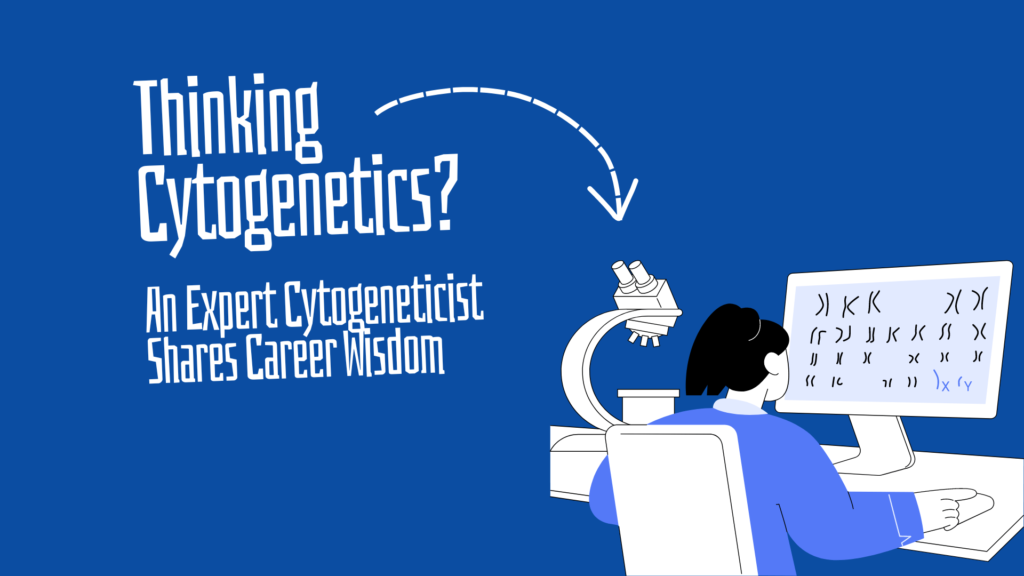“Want to be an expert cytogeneticist? A doctorate just isn’t enough. 7 Essential Technical Expertise to Become a Cytogeneticist in this article.”
Out of all the different branches of genetics, the most important and specialized field is cytogenetics. It is a traditional, the oldest and conventional field, specifically studies chromosomes.
Since its origin to date, the testing approach roughly remained the same. Less automation and more manual. Cytogenetic analysis highly relies on the expertise and experience of a cytogeneticist to conduct the experiment and to perform analysis, respectively.
Even, the high-end computer system doesn’t perform the analysis part 100% accurately. Thus, an expert cytogeneticist is always needed. Therefore, becoming a cytogeneticist is an evergreen and demanding career option.
However, as mentioned, specialized technical skills and years of experience are mandatory to master this field. In this article, I will explain 7 essential skills that are required to become a successful cytogeneticist.
I worked in cytogenetic and molecular cytogenetic labs for years. From my personal experience, I bet you, that if you master these technical skills, your career in cytogenetics will charm.
Stay tuned.
Related article: Thinking Cytogeneticist? An Expert Cytogeneticist Shares Career Wisdom.

Key Topics:
Skills Required To Become a Cytogeneticist:
A cytogeneticist requires technical and non-technical skills to charm their career and become successful.
On a technical side, one must have expertise in cell culture and harvesting, staining and banding, microscopy, karyotyping and analysis, basic computer proficiency, lab skills– pipetting, centrifugation, chemical preparation, etc and troubleshooting.
Besides, other non-technical skills like-
Time management, workload management, attention to detail, self-discipline, top-notch observation and analysis power, and lab and manpower management should be required too.
However, these (non-technical) skills can be learned over time and can’t make much difference in the beginning. So what makes you strong as a cytogeneticist is your technical competency. Let’s comprehensively understand each skill one by one.
Common lab techniques:
What makes a difference between ‘just results’ and ‘amazing results?’ Trust me that’s common lab techniques– pipetting, chemical preparation, centrifugation and vertexing, etc.
We know we have to deal with µG concentration and µL volumes, along with extensive chemical preparation. So every single pipetting should be nearly perfect. A single µL volume fluctuation can fail the experiment.
Let me give you an example, hypotonic treatment with KCl is a crucial step during karyotyping. It requires 0.75 mM KCl. Any slight fluctuation in the concentration can ruin the metaphase plates.
It’s that important!
In addition to that you should have a keen knowledge of how to handle and operate instruments like a centrifuge, safety cabinet, vortex, etc. So the first skill one must have to master is common lab skills.
Read more: 10 Common Lab Techniques to Work in a Genetic Lab.
Cell culture and harvesting:
Karyotyping is an important and primary cytogenetic technique that requires cell culture and harvesting. Karyotyping helps study numerical and ‘some’ structural chromosomal abnormality in a cost-effective way.
Adding to this, let me tell you that it’s routinely performed in a genetic lab. So a cytogeneticist must have a keen cell culture and harvesting knowledge and hands-on experience in the same.
They should know
- how to handle and culture various samples (Blood, amniotic fluid, chorionic villi, tumor tissues, etc).
- How to culture cells.
- How to maintain sterile conditions.
- How to choose a cell culture media.
- How to incubate cell culture.
- How to harvest cells.
- How to give hypotonic treatment and collect metaphase plates.
Staining and banding:
Chromosomal staining and banding are techniques to visualize and study chromosomes and related abnormalities. In the field of genetics, staining is a bit off thing! But for cytogenetic investigations, you should learn it.
You have to learn slide preparation, and slide staining, and perform various banding techniques like- GTG banding, NOR banding, R- banding, etc. The karyotyping success rate depends on how you prepare slides.
Microscopy:
Again microscopy is usually out of the scope in the field of genetics, as the major focus would be on DNA, RNA, or chromosomes. For chromosomal studies, microscopy is needed.
A cytogeneticist should have comprehensive training and knowledge of operating a microscope, fine focusing, shifting between lenses and evaluating microscopic fields. In addition, fluorescent microscopy knowledge is also required for spectral karyotyping.
Karyotype and analysis:
Now, up to this, all these skills can be learned easily, but karyotype preparation and analysis is a difficult and tedious part because even strong computer software fails to do it accurately.
So cytogeneticist’s expert eyesight is needed. To become an expert in cytogenetic analysis or chromosome preparation, one has to practice for years learning karyotype preparation and anomaly analysis.
Read more: 50 Ways You Can Be a Geneticist Today.
Common computational skills:
Along with all these wet lab skills, one also should have knowledge of basic computer operation. How to handle various software, perform different operations, process data and prepare reports.
Troubleshooting:
Troubleshooting is an important part of cytogenetics. The whole karyotyping process, from cell culture to analysis, involves many sensitive and crucial procedures. Problems in any step, cause failure.
So for a cytogeneticist, it is important to learn troubleshooting. Meaning, that they must know the reason behind the result failure or problem in karyotyping. And yet again, that only be learned by working for years in a cytogenetic lab.
Read more: How to Select The Most Effective Genetic Assay?
Wrapping up:
Becoming a cytogeneticist is a challenging and exciting journey. Despite having a difficult path to master these skill sets, it’s the most rewarding! A cytogeneticist earns a decent salary due to this factor.
I wrote this article for aspirant cytogeneticists and for those who want to become the one! So I guess now, it’s clear! you have to gain exposure prior to becoming a cytogeneticist, either by doing a job for a few years or being a part of some lab during your research tenure.
I hope this article makes sense for you. Do share it and let me know your thoughts.

